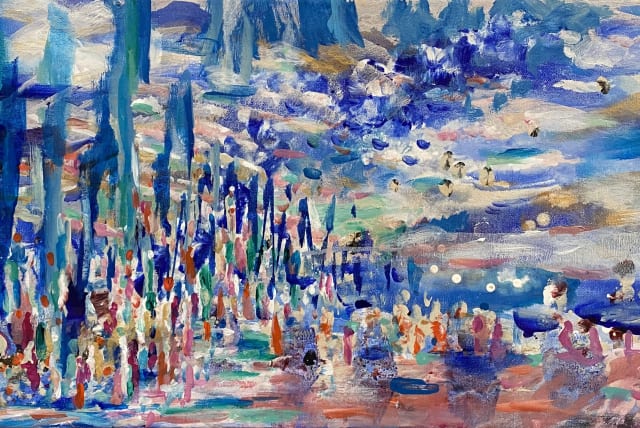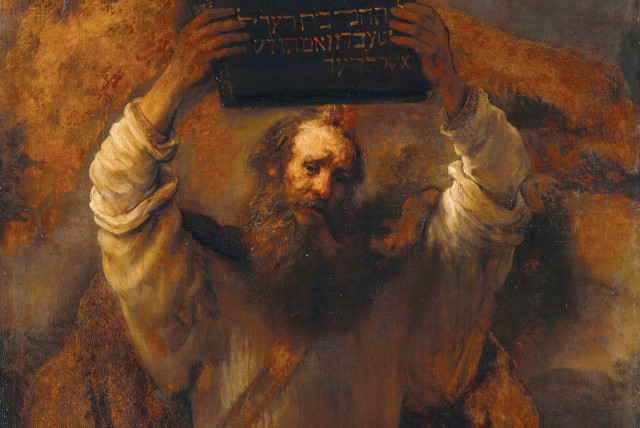Parashat Vayechi: A life’s conclusion

In this “nighttime” we are going through, may Jacob’s blessing of protection be with us.
The word vayechi, “and [Jacob] lived,” seems paradoxical, for this parsha deals with Jacob’s preparations for death – his death – and the return of his body to the Land of Israel to be buried in the Cave of the Patriarchs.
The Lubavitcher Rebbe asks, “What is life?” and answers that a person is only truly alive when he is about to die and realizes that all one’s trials and tribulations are part of life and that one remains alive in deep connection to God.
“And he lived in the land of Egypt for 17 years.” According to the midrash, these 17 years were the best years of Jacob’s life – years of prosperity, goodness, and peace.
His other 130 years were filled with toil and pain (midrash, Ba’al Haturim). He had had to struggle with his fear of Esau and Laban, the rape of his daughter Dinah, the death of his beloved wife Rachel, and what he believed was the death of his son Joseph.
The belief that Joseph had died caused him such deep sadness that the divine spirit departed from him. But with the knowledge that Joseph was alive, the divine spirit had returned to him, to reassure him about the descent to Egypt.
Nonetheless, when Jacob realizes that his end is approaching, his first act is to call for Joseph and ask him to swear that he will take his body out of Egypt to be buried in the place of his fathers. Despite Jacob’s prosperity in Egypt, he does not want to remain there.
Rashi gives several reasons for Jacob’s request, one of which is that the soil of Egypt is destined to turn into lice. Perhaps this is a veiled reference to the fact that although Jews may prosper for a time in some place of exile, eventually the ground “turns to lice” beneath them.
After making Joseph swear to bury him in Hebron, Jacob falls ill and Joseph comes to him with his two sons, whom Jacob blesses: “…the angel who delivered me from all evil, bless the lads… and let them multiply like fishes in the midst of the earth” (Genesis 48:16).
The Zohar says that this is the same angel – the deliverer of the world, protector of mankind, bringer of blessings – that God sends to accompany the Israelites in their desert travels: “Behold, I am sending an angel before you to guard you on the way and bring you to the place that I have prepared” (Exodus 23:20).
After blessing the boys, Jacob says to Joseph, “Behold, I die; but God shall be with you, and bring you back to the land of your fathers.” Jacob uses the plural “you,” meaning his descendants, the children of Israel.
Finally, Jacob summons all his sons to hear his final words of admonition and encouragement. Jacob’s blessing to his sons is also the first example of the “ethical will” in which a person at the end of his or her life summarizes the knowledge and wisdom he or she wants to transmit to the next generation.
Significantly, Jacob’s “ethical will” concludes with a repetition of his request to be buried in the Cave of the Patriarchs. The Lubavitcher Rebbe said that Jacob wanted to provide the solution for the Jewish people to leave exile. Being buried in the Land of Israel meant that Jacob remained higher than the Egyptian exile, thus empowering his children with the spiritual potential to rise above their confinement and eventually escape. Jacob’s request is carried out after he is embalmed according to Egyptian practice.
IN THE account of the journey, the ambiguity of the Israelites’ position in Egypt is subtly hinted at. On the one hand, it appears that their prestige is still high, and that Joseph and Jacob are held in reverence. “And Joseph went up to bury his father; and with him went up all the servants of Pharaoh, the elders of his house, and all the elders of the land of Egypt. And all the house of Joseph, and his brothers…” (Genesis 50:8).
The members of Pharaoh’s court are mentioned before Joseph’s family! Furthermore, when the inhabitants of Canaan see this company mourning for Jacob “at the threshing floor of Atad, which is beyond the Jordan,” they say, “This is a grievous mourning for the Egyptians,” and they name the place Avel-Mitzrayim – “the mourning of Egypt.” Externally, it appears that the children of Israel are “assimilated.”
On the other hand, the first sign of a rift can be seen in the fact that Joseph does not go directly to Pharaoh with his request to be allowed to bury his father in the land of Canaan. Instead, he asks members of the court to present the petition for him (Genesis 50:4). At the beginning of the Book of Exodus, we shall hear of “a new king who did not know Joseph” (Exodus 1:8).
After burying their father, Joseph and his brothers return to Egypt. But in the second-to-last verse of Genesis, Joseph explicitly prophesies the Exodus: “And Joseph made the children of Israel swear, saying, God will surely visit you, and you shall bring my bones up from here” (Genesis 50:25).
These words, in turn, will echo in the message that God tells Moses to bring to the elders of Israel: “I have surely visited you…I will bring you up out of the affliction of Egypt… to a land flowing with milk and honey.” According to one midrash, Asher told Joseph’s words to his daughter Serach, whom Jacob had blessed with an abnormally long life. She was still alive at the time of the Exodus, and she heard the echo of Joseph’s words in the message transmitted by Moses. Thus Moses was “authenticated” as the deliverer.
In Yoram Raanan’s painting Journey to Beyond, which captures the procession as it moves beyond the Jordan River, we sense the parallel to the Exodus. The waters appear wide and agitated, like the waves of the Red Sea that the Israelites will eventually cross. The color blue predominates, giving the feeling of motion toward a distant, unknown future.
In Raanan’s words, “Art is for people to take them wherever it leads them.” The thick blue vertical strokes make us think of the cypress, a tree often associated with mourning. The sharp zigzags of darker blue amid the lighter blue and rose strokes that suggest human figures add a somber note and perhaps also indicate the mixed and unharmonious nature of the company. As Jacob is brought to his final resting place, the Egyptians and the Israelites go forward together in unity; but in the future, the chariots that accompany the Israelites will chase them.
As the descendants of those who crossed the Jordan, we include Jacob’s blessing to Joseph’s sons among the passages that accompany the nighttime Shema as a prayer for protection. As we transition into night and surrender ourselves to sleep, we call upon God to be with us and guard us from evil through His angel. Nighttime is a metaphor for the unknown, for moments when we are not in control, when we need God to carry us through from darkness to light.
We are in what feels like a time of “nighttime” (the heaviest fighting in Gaza, when our soldiers are most in danger, occurs at night). In this “nighttime” we are going through, may Jacob’s blessing of protection be with us.
Meira Raanan is the author of Art of Revelation: A Visual Encounter with the Jewish Bible, a commentary on the paintings by her husband, Yoram Raanan. She also teaches Jewish meditation.
Esther Cameron is a poet, scholar, and essayist living in Jerusalem. She is editor-in-chief of The Deronda Review.
Jerusalem Post Store
`; document.getElementById("linkPremium").innerHTML = cont; var divWithLink = document.getElementById("premium-link"); if (divWithLink !== null && divWithLink !== 'undefined') { divWithLink.style.border = "solid 1px #cb0f3e"; divWithLink.style.textAlign = "center"; divWithLink.style.marginBottom = "15px"; divWithLink.style.marginTop = "15px"; divWithLink.style.width = "100%"; divWithLink.style.backgroundColor = "#122952"; divWithLink.style.color = "#ffffff"; divWithLink.style.lineHeight = "1.5"; } } (function (v, i) { });

